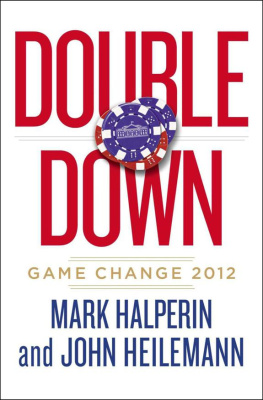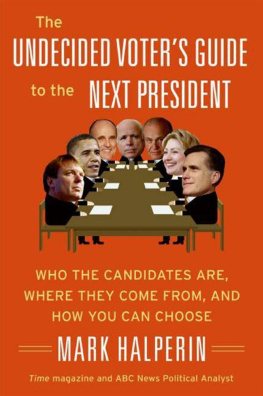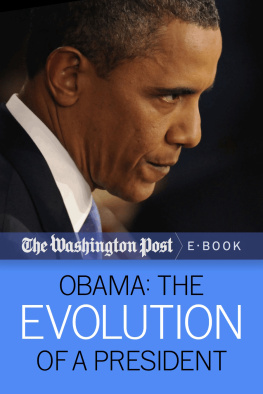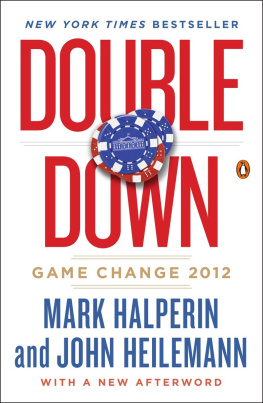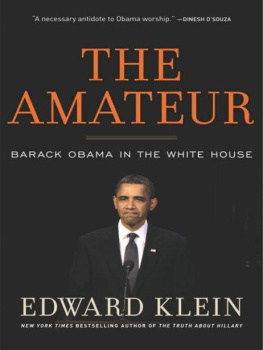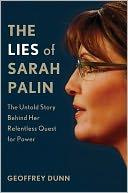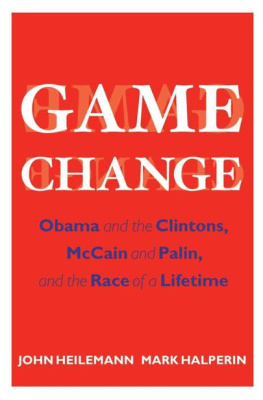A LSO BY M ARK H ALPERIN AND J OHN H EILEMANN
Game Change: Obama and the Clintons, McCain and Palin, and the Race of a Lifetime

THE PENGUIN PRESS
Published by the Penguin Group
Penguin Group (USA) LLC
375 Hudson Street
New York, New York 10014

USA Canada UK Ireland Australia New Zealand India South Africa China
penguin.com
A Penguin Random House Company
First published by The Penguin Press, a member of Penguin Group (USA) LLC, 2013
Copyright 2013 by Mark Halperin and John Heilemann
Penguin supports copyright. Copyright fuels creativity, encourages diverse voices, promotes free speech, and creates a vibrant culture. Thank you for buying an authorized edition of this book and for complying with copyright laws by not reproducing, scanning, or distributing any part of it in any form without permission. You are supporting writers and allowing Penguin to continue to publish books for every reader.
All photos Christopher Anderson/Magnum Photos
ISBN: 978-1-101-63870-5
Version_1 For Karen and my family MEH For Diana and my dad JAH
CONTENTS
PROLOGUE
T HE DEBATE WAS ONLY a few minutes old, and Barack Obama was already tanking. His opponent on this warm autumn night, a Massachusetts patrician with an impressive rsum, a chiseled jaw, and a staunch helmet of burnished hair, was an inferior political specimen by any conceivable measure. But with surprising fluency, verve, and even humor, Obamas rival was putting points on the board. The president was not. Passive and passionless, he seemed barely present.
It was Sunday, October 14, 2012, and Obama was bunkered two levels below the lobby of the Kingsmill Resort, in Williamsburg, Virginia. In a blue blazer, khaki pants, and an open-necked shirt, he was squaring off in a mock debate against Massachusetts senator John Kerry, who was standing in for the Republican nominee, Mitt Romney. The two men were in Williamsburg, along with the presidents team, to prepare Obama for his second televised confrontation with Romney, forty-eight hours away, at Hofstra University, in Hempstead, New York. It was an event to which few had given much thought. Until the debacle in Denver, that is.
The debate in the Mile High City eleven days earlier jolted a race that for many months had been hard-fought but remarkably stable. From the moment in May that Romney emerged victorious from the most volatile and unpredictable Republican nomination contest in many moons, Obama held a narrow yet consistent lead. But after Romney mauled the president in Denver, the wind and weather of the campaign shifted dramatically in something like a heartbeat. The challenger was surging. The polls were tightening. Republicans were pulsating with renewed hope. Democrats were rending their garments and collapsing on their fainting couches.
Obama was nowhere in the vicinity of panic. You ever known me to lose two in a row? he said to friends to calm their nerves.
The presidents advisers were barely more rattled. Yes, Denver had been atrocious. Yes, it had been unnerving. But Obama was still ahead of Romney, the sky hadnt fallen, and they would fix what went wrong in time for the town hall debate at Hofstra. Their message to the nervous nellies in their party was: Keep calm and carry on.
Williamsburg was where the repair job was supposed to take place. The Obamans had arrived at the resort, ready to work, on Saturday the 13th. The first day had gone well. The president seemed to be finding his form. He and Kerry had been doing mock debates since August, and the session on Saturday night was Obamas best yet. Everyone exhaled.
But now, in Sunday nights run-through, the president seemed to be relapsing: the disengaged and pedantic Obama of Denver was back. In the staff room, his two closest advisers, David Axelrod and David Plouffe, watched on video monitors with a mounting sense of uneasewhen, all of a sudden, a practice round that had started out looking merely desultory turned into the Mock from Hell.
The moment it happened could be pinpointed with precision: at the 39:35 mark on the clock. A question about home foreclosures had been put to POTUS; under the rules, he had two minutes to respond. Before the mock, Kerry had been instructed by one of the debate coaches to interrupt Obama at some juncture to see how he reacted. Striding across the bright red carpet of the set that the presidents team had constructed as a precise replica of the Hofstra town hall stage, Kerry invaded the presidents space and barged in during Obamas answer.
The presidents eyes flashed with annoyance.
Dont interrupt me, he snapped.
When Kerry persisted, Obama shot a death stare at the moderatorhis adviser Anita Dunn, standing in for CNNs Candy Crowleyand pleaded for an intercession.
The presidents coaches had persistently worried about the appearance of Nasty Obama on the debate stage: the variant who infamously, imperiously dismissed his main Democratic rival in 2008 with the withering phrase Youre likable enough, Hillary. His advisers saw glimpses of that side of him in their preparations for Denvera manifestation of a personal antipathy for Romney that had grown visceral and intense. Now they were seeing it again, and worse. The admixture of Nasty Obama and Denver Obama was not a pretty picture.
Challenged by Kerry with multipronged attacks, the president rebutted them point by point, exhaustively and exhaustingly. Instead of driving a sharp message, he was explanatory and meandering. Instead of casting an eye to the future, he litigated the past. Instead of warmly establishing connections with the town hall questioners, he pontificated airily, as if he were conducting a particularly tedious press conference. While Kerry was answering a query about immigration, Obama retaliated for the earlier interruption by abruptly cutting him off.
In the staff room, Axelrod and Plouffe were aghast. Sitting with them, Obamas lead pollster, Joel Benenson muttered, This is unbelievable .
Watching from the set, the renowned Democratic style coach Michael Sheehan scribbled furiously on a legal pad, each notation more alarmed than the last. Reflecting on Obamas interplay with the questioners, Sheehan summed up his demeanor with a single word: Creepy.
After ninety excruciating minutes, the Mock from Hell was over. As Obama made his way for the door, he was intercepted by Axelrod, Plouffe, Benenson, and the lead debate coach, Ron Klain. Little was said. Little needed to be said. The ashen looks on the faces of the presidents men told the tale.
Obama left the building and returned to his sprawling quarters on the banks of the James River with his best friend from Chicago, Marty Nesbitt, to watch football and play cards. His advisers retreated to the presidents debate-prep holding room to have a collective coronary.
That the presidential debates were proving problematic for Obama came as no real surprise to the members of his team. Many of themAxelrod, the mustachioed message maven and guardian of the Obama brand; Plouffe, the spindly senior White House adviser and enforcer of strategic rigor; Dunn, the media-savvy mother superior and former White House communications director; Benenson, the bearded and nudgy former Mario Cuomo hand; Jon Favreau, the dashing young speechwriterhad been with Obama from the start of his meteoric ascent. They knew that he detested televised debates. That he disdained political theater in every guise. That, on some level, he distrusted political performance itself, with its attendant emotional manipulations.
The paradox, of course, was that Obama had risen to prominence and power to a large extent on the basis of his preternatural performance skillsand his ability to summon them whenever the game was on the line. In late 2007, when he was trailing Hillary Clinton in the Democratic nomination fight by thirty points. In the fall of 2008, when the global financial crisis hit during the crucial last weeks of the general election. In early 2010, when his signature health care reform proposal seemed destined for defeat. In every instance, under ungodly pressure, Obama had set his feet, pulled up, and drained a three-pointer at the buzzer.
Next page
